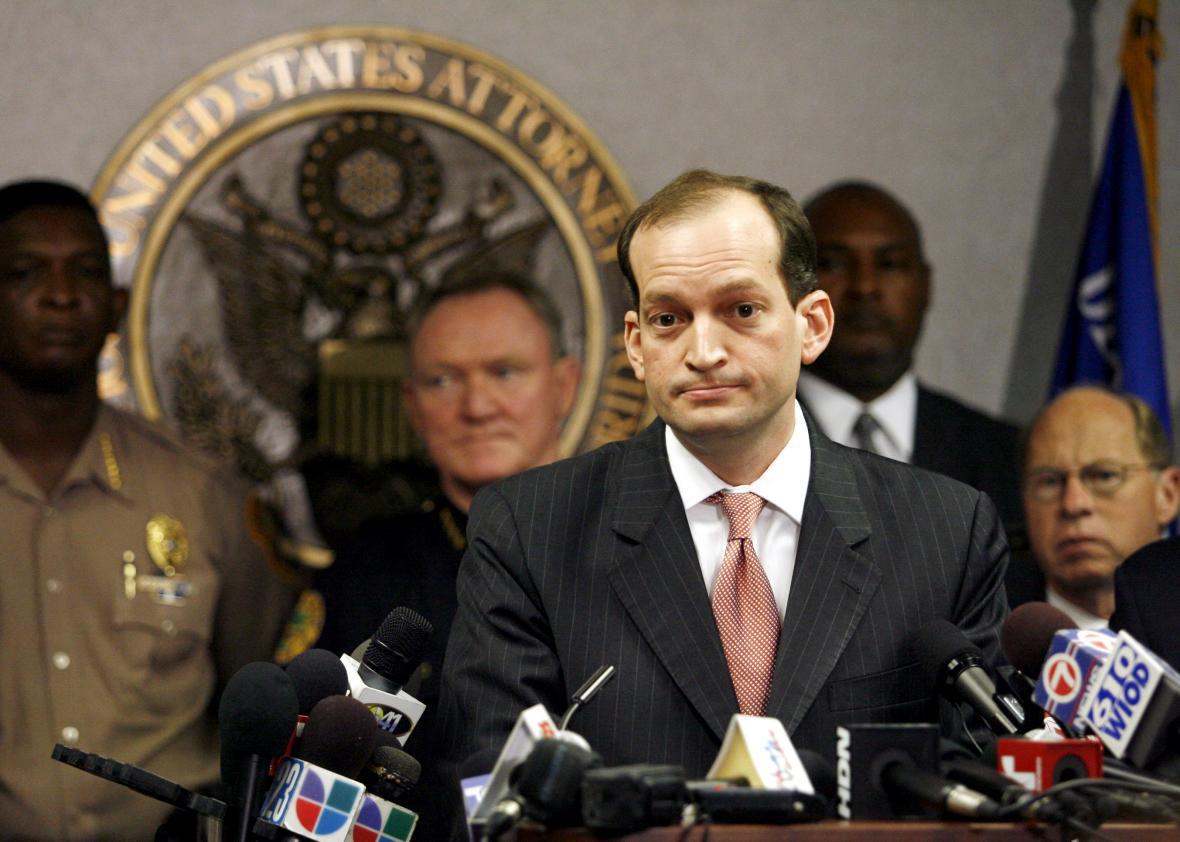Here are a few words that immediately come mind when considering President Trump’s new nominee to be secretary of labor, R. Alexander Acosta: Dull. Accomplished. Conservative. Dull.
Perhaps this was to be expected. Trump’s first pick for the job, fast food CEO Andrew Puzder, was a fascinating train wreck who had to withdraw his name Wednesday after alienating liberals, conservatives, and anybody who thought using bikini models to sell burgers was kind of crass.
Acosta is pretty much the opposite—a textbook product of the Republican legal and political establishment. Currently the dean of Florida International University’s College of Law, he’s a double Harvard grad who clerked for Supreme Court Justice Samuel Alito while the judge served on the 3rd U.S. Circuit Court of Appeals. He sat on the National Labor Relations Board under President George W. Bush for a couple of years before moving to the Justice Department to head the Civil Rights Division. He later became the U.S. attorney in Miami, where he prosecuted the corrupt lobbyist Jack Abramoff, among others. He likes to give talks at the Federalist Society, which is pretty much the Rotary Club for deeply conservative lawyers.
He was also born in Cuba, meaning he would be the only Hispanic member of Trump’s Cabinet. And he spoke out against anti-Muslim discrimination in testimony before Congress in 2011, emphasizing how federal prosecutors aggressively investigated anti-Islam backlash crimes after the Sept. 11 attacks.
Labor groups haven’t had much time to dig into Acosta’s record, and they’ll be sure to scrutinize the opinions he authored or joined while on the NLRB, which decides cases on union organizing and unfair labor practices. But so far, there seems to be some cautious optimism that he’ll be an improvement over Puzder, who had never worked in government and many feared would be deeply hostile to the agency’s core mission of policing and enforcing labor law.
“He was in the Civil Rights Division,” the National Employment Law Project’s Deborah Berkowitz said of Acosta. “He did uphold the law there. He did prosecute Jack Abramoff and others. He has a history of public service. And gets what public service is about. And I think that’s important. Because in the end, the Department of Labor is a law enforcement agency.”
Wilma Liebman, one of Acosta’s Democratic colleagues on the NLRB, also had flattering things to say about the nominee in an interview with Politico:
“Even though we often came out differently on policy conclusions or the outcome of a case, he was a good colleague and he was always willing to talk and bounce around ideas,” Liebman said. “I would say he’s very smart and he’s an independent thinker.”
Liebman said that while unions may not “be thrilled with every decision he’ll make…they’ll get a good hearing.”
Is there anything controversial that Democrats might latch onto? Sort of. For starters, Bush’s Civil Rights Division was marred by a scandal over politicized hiring practices thanks to an official named Bradley Schlozman, who (illegally) tried to hire Republicans and had a habit of calling Democrats “libs” and “commies” and “pinkos.” Of his HR philosophy, Schlozman once mused: “I just want to make sure we don’t start confining ourselves to, you know, politburo members because they happen to be a member of some, you know, psychopathic left-wing organization designed to overthrow the government.” Swell guy!
Acosta, who ran the Civil Rights Division from 2003 to 2005, wasn’t directly implicated in any wrongdoing. But he did leave hiring to Schlozman. And a January 2009 report by the Justice Department’s Office of the Inspector General concluded that Acosta had failed to take any action despite some obvious red flags concerning Schlozman’s activity.
Bush’s Civil Rights Division was also accused by critics of backing away from traditional voting rights cases involving black and Hispanic victims, and of seeking to protect whites against reverse-discrimination instead. However, a March 2013 inspector general report couldn’t find evidence that was really the case. Meanwhile, Acosta substantially increased the number of voting rights cases on behalf of Spanish and other foreign language speakers.
What about his time as a U.S. attorney? It’s possible that Democrats will bring up Acosta’s decision not to file federal charges against Jeffrey Epstein, the billionaire pedophile financier who, as the New York Post summed it up, has been “accused of recruiting dozens of underage girls into a sex-slave network, buying their silence and moving along.” After a ferocious battle with federal and Florida prosecutors, Epstein pleaded guilty to state charges of soliciting an underage prostitute in 2008 and served a fairly cushy 18-month jail sentence. Many have questioned Acosta’s choice to, quite literally, not make a federal case of it, which led to an unusual lawsuit by some of Epstein’s alleged victims. Acosta has defended his choice, however, essentially saying it was necessary to win a plea that would send Epstein to prison.
Are Democrats going to try and claim Acosta purposefully gave a sweetheart deal to a rich sex offender? It seems unlikely. Again, this is the same guy whose office prosecuted Abramoff. It would be a bit dissonant to argue that he’s soft on wealthy, politically connected types.
There’s no reason to think Acosta will be particularly friendly to unions or workers. Nobody should expect any new pro-labor regulations to emerge from his department. But at this very early stage, it at least seems like he might bring a dose of professionalism and civic-mindedness to the Trump administration.
So I might have to take back what I said Wednesday about how Puzder’s defeat wasn’t much of a victory for liberals. If so, that’s actually a relief.
